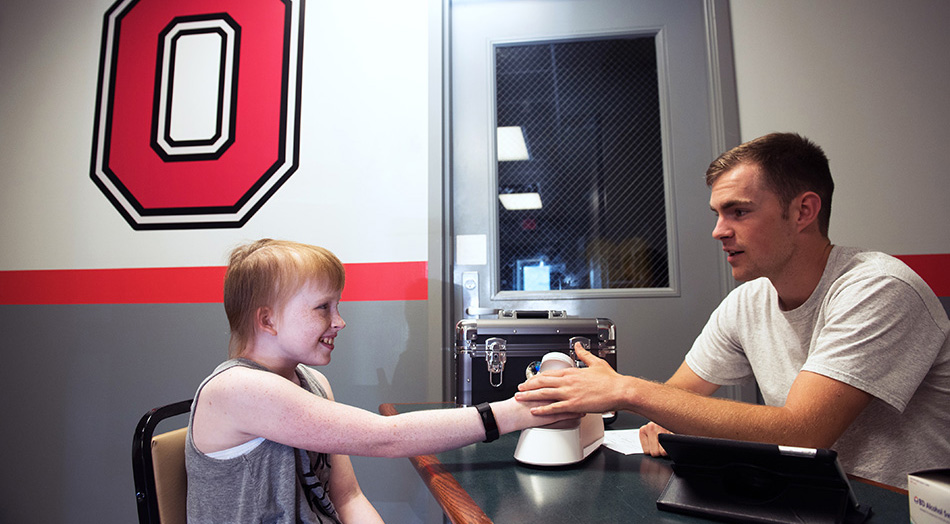Learning new ways to touch lives of cancer survivors
Student discovers new paths at Ohio State to help populations in need

When Jeff Laubert hops up on the table at the front of the room, the kids’ faces light up instantly. “Macarena” pushups require a lot of body strength in the right places, but Laubert makes the exercise look easy. Tonight’s lesson is about staying active, and the pediatric cancer survivors grin as Laubert performs pushups that use moves from the famous ’90s dance song.
Not long ago, Ohio State student Laubert wasn’t sure where life would take him. But tonight, he is in his element.
He guides the kids over to a table with a small machine, reminding them where to place their palm to measure skin carotenoids — a measure of how many fruits and vegetables they’re eating. Outside, he walks alongside the kids down the paths of Ohio State’s Waterman Farm, helping them pick tomatoes off vines or find the perfect pepper to put in their harvest bags.
“I get some great interaction with them,” says Laubert, a student in the College of Medicine’s School of Health and Rehabilitation Sciences, where he studies in the Medical Dietetics Program. “It’s been amazing to have these experiences.”
Laubert discovered his enthusiasm for interactive research during his senior year in high school. Forced to scrap his initial dream of enlisting in the military, he found a new path that still allowed him to give back to his family, his community and his country.
At Ohio State, he’s not only learned real-world, hands-on research methods while working alongside expert faculty, but he’s taken his passion for helping others and turned it into real results. Along the way he’s connected his interest — nutrition — to other disciplines such as medicine, cancer research, agriculture, art and sports in order to extend the impact on people in need.
Helping to harvest
It’s the final week of Harvesting Hope 4 Kids, and the participants sit in one of the few buildings on Ohio State’s sprawling Waterman Farm property, a unique working farm that also serves as a learning laboratory just a short bus ride from central campus.
Laubert and a few other students and research assistants float around the room as the pediatric cancer survivors draw pictures for a comic book Laubert’s creating — a memento the kids can hold onto while they continue along the path of healing.
The program is a partnership between The Ohio State University Comprehensive Cancer Center and Nationwide Children’s Hospital in which survivors of pediatric cancer come out to the university farm to learn about the importance of healthful dietary patterns. The kids also learn about physical activity, create art projects with fruits and veggies and even harvest their own produce every week.
The program relies on student researchers such as Laubert to collect data points and assess biomarkers in the kids.
“I get a lot of experience with data collection and assessment, which is awesome,” Laubert says. “I’m also there to keep the kids company. I love being out there and seeing them every week.”
Dr. Colleen Spees, an assistant professor and cancer researcher with the College of Medicine, runs garden studies at Waterman Farm. It’s part of a larger effort that supports cancer survivors of all ages by allowing them to harvest their own fresh produce and learn how healthful dietary patterns can assist in cancer recovery. Spees and her fellow researchers have documented improved health outcomes and quality of life in cancer survivors after participating in this unique program.
Discovering a new path
Throughout high school, Laubert knew exactly where he’d be heading after graduation.
“All my life I dreamed of going into the military,” he recalled. But a concussion during his sophomore year on the Olentangy Orange football team derailed his plans. Laubert says the injury disqualified him from military service.
“I was devastated,” he says.
Not sure where to turn or what to do, Laubert remembers the moment he figured out his next steps. At a family gathering, he talked with relatives about their health struggles, including obesity, diabetes and high blood pressure. He saw their unhealthful eating habits.
It inspired him.
“I wanted to do something to help my family, help my country,” he says. “I figured what better way to help them than by focusing on nutrition.”
The Columbus native got accepted to Ohio State and wanted to get a head start on research opportunities even before coming to the Columbus campus. The summer before his freshman year, he connected with Spees through a series of emails, ensuring that he could dive right into the research studies when he arrived to campus. Since then, Laubert’s been involved in several of Spees’ studies, picking up valuable research techniques and helping dozens of participants along the way.
“Jeff has been an exceptional student, excellent role model and empathetic human being who’s taking full advantage of the fantastic learning opportunities that Ohio State provides,” Spees says.
Along the way, Laubert’s also extended his interest in nutrition to other areas.
Today he also works alongside Jackie Buell, an assistant clinical professor in the School of Health and Rehabilitation Sciences. He administers bone density scans that give athletes and coaches information on body composition. The result? Better training plans and healthier athletes.
“Getting involved in this research also opens doors,” he says.
Laubert has presented his research findings from Dr. Spees' studies at several conferences. He took first place in the behavioral science category at an Ohio State research symposium last year. Last summer, he presented at a national nutrition conference in Washington, D.C.
His Ohio State experiences — working with faculty, helping families, seeing the impact of his work — also serve as a foundation for his goal after graduation: to work on clinical trials that could help change lives.
“This research that Ohio State has given me the opportunity to get involved with,” Laubert says, “it really is life changing.”